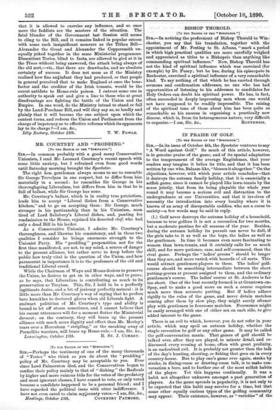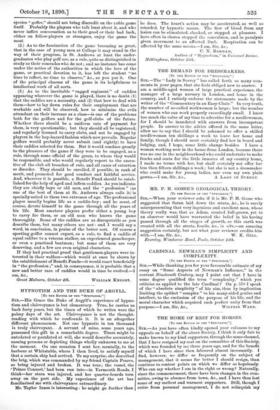IN PRAISE OF GOLF.
[To THE EDITOR OF THE "SPECTATOR."] its issue of October 4th, the Spectator ventures to say "A Word against Golf." So much of this article, however, is in genuine praise of the game, and of its special adaptation to the temperament of the average Englishman, that your readers may imagine it belies its title, and that it has been written by one who, Balaam -like, "blesses it altogether." On the objections, however, with which your article concludes—that it destroys the autumn family holiday, that it is essentially a selfish game, since it cannot be played like lawn-tennis by the sexes jointly, that from its being playable the whole year round it may become a serious evil and distraction to the undergraduate at our Universities, and that it involves of necessity the introduction into every locality where it is known of an army of disreputable caddies, who are a curse to. society—a few words may be said in reply.
(1.) Golf never destroys the autumn holiday of a household, because to true golfers it is not a recreation for two months, but a moderate pastime for all seasons of the year. Besides, during the autumn holiday its pursuit can never be dull, if the girls take to it as well as the boys, the ladies as well as the gentlemen. In time it becomes even more fascinating to women than lawn-tennis, and it certainly calls for as much skill, and for more patience, ease, and self-command, than the rival game. Perhaps the "ladies' greens" should be longer than they are, and more varied, with hazards of all sorts. This would attract gentlemen-players to them. The ladies' golf- course should be something intermediate between the short putting-greens at present assigned to them, and the °Ain ory gentlemen's course. The ladies' course at St. Andrews is far too short. One of the best recently formed is at Grantown-on- Spey, and to make a good score on such a course requires much more than accurate putting. But if ladies adhere rigidly to the rules of the game, and never detain matches coming after them by slow play, they might surely oftener play with gentlemen in foursome matches. Foursomes might be easily arranged with one of either sex on each side, to give added interest to the game.
There is an evil to which, however, you do not refer in your article, which may spoil an autumn holiday, whether the staple recreation be golf or any other game. It may be called the golf-conversation mania. That games of golf should be talked over, after they are played, in minute detail, and re- discussed every evening at home, often with great prolixity, is an undoubted evil. It is probably not greater than the talk of the day's hunting, shooting, or fishing that goes on in every country-house. But to play one's game over again, stroke by stroke, in dining-room or drawing-room talk, is to make con- versation a bore, and to further one of the most selfish habits of the player. Yet this happens continually. It was a habit not altogether unknown amongst a past generation of players. As the game spreads in popularity, it is not only to be expected that this habit may survive for a time, but that some other equally curious types of the golfing community may appear. Their existence, however, as " varieties " of the species " gofler," should not bring discredit on the roble game itself. Probably the players who talk least about it, and who never inflict conversation as to their good or their bad luck, either on fellow-players or strangers, enjoy the game the most.
(2.) As to the fascination of the game becoming so great, that in the case of young men at College it may stand in the way of their progress, in St. Andrews at least the under- graduates who play golf are, as a rule, quite as distinguished in study as their comrades who do not; and no instance has come under the notice of the authorities in which the love of the game, or practical devotion to it, has left the student "no time to reflect, no time to observe," &,c., as you put it. One of the principal charms of the game is its helpfulness to intellectual work of all sorts.
(3.) As to the inevitable "ragged regiment" of caddies appearing wherever the game is played, there is no doubt (1) that the caddies are a necessity, and (2) that how to deal with them—how to lay down rules for their employment that are workable and will be observed, how to minimise the evils attendant on their increase as a class—is one of the problems both for the golfers and for the golf-clubs of the future. Whether there should be a uniform rate of payment for them, is very questionable; but they should all be registered, and regularly licensed to carry clubs, and not be engaged by players in the hap-hazard fashion which now prevails. Regular golfers would probably never submit (and rightly) to have their caddies selected for them. But it would conduce greatly to the pleasure of the game if they were to be engaged, as a rule, through some official of- the green, to whom they would be responsible, and who would regularly report to the execu- tive of the club all breaches of rule, and all cases of extortion or disorder. They should be enrolled, if possible, in rank of merit, and promoted for good conduct and faithful service. And, wherever it is possible, a Benefit Fund should be estab- lished for the help of aged and infirm caddies. As you indicate, they are chiefly boys or old men, and the " profession " (as one of the best of them at St. Andrews always calls it) is specially suited to these two extremes of age. The professional player usually begins life as a caddie-boy; and he must, of course, devote himself to the game through all the years of his life. Most amateur players prefer either a young boy to carry for them, or an old man who knows the game -thoroughly. Some of the caddies are as disreputable as you describe them, but many others are not : and I would say a word, in conclusion, in praise of the better sort. Of course a sporting golfer cannot expect, as a rule, to find a caddie of equal calibre to a veteran stalker, an experienced gamekeeper, or even a practised boatman; but some of them are very deserving, and a few are even original characters.
If they had practical proof that gentlemen-players were in- terested in their welfare—which would at once be shown by the establishment of Benefit Funds—it would react beneficially in "the profession ;" and, in consequence, it is probable that a new and better race of caddies would in time be evolved.—I am, &c.,







































 Previous page
Previous page